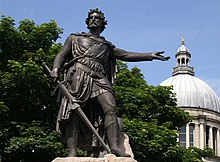William Wallace
Sir William Wallace | |
|---|---|
 | |
| Born | c. 1270 Elderslie, Renfrewshire, Scotland |
| Died | 23 August 1305 (aged c. 34 or 35) |
| Cause of death | Death penalty by hanging |
| Occupation | Commander in the Scottish Wars of Independence |
| Children | None recorded |
| Parent(s) | Malcolm Getere (father), Margaret Crauford (mother) |
William Wallace (c. 1270 – 23 August 1305) was a Scottish knight who fought the King of England (Edward I) in the Middle Ages. He was born in c. 1270, and was hanged by the English on 23 August 1305 and had died on the same day. Scotland had been claimed by Edward, and Wallace refused allegiance to Edward.
Origins
Wallace was probably born around 1270-1272. Little is known about his birth or childhood. Exactly where and when Wallace was born is not very clear. Some people say he was born about 1272, but a book printed in the 16th century called History of William Wallace and Scottish Affairs says he was born in 1276. Tradition says he was born in Elderslie, near Paisley in Renfrewshire. There are links with Ayrshire as well, and it is not clear whether Wallace first fought the English in Ayrshire or Lanark.[1][2][3] Tradition sees Wallace as a being a 'commoner', or normal person. Robert the Bruce, who also fought the English, was seen as being more noble. But this is not strictly true because Wallace's family were minor nobles.
The struggle
King Edward offered Scotland a deal which allowed them to have a Scottish king so long as King Edward was still in charge. This required the Scottish nobles to kneel, and swear allegiance to his sovereignty. Wallace refused, and led the resistance which followed. A series of battles were fought:
- Battle of Stirling Bridge, 11 September 1297: won by Wallace against a much larger force. In the six months following Stirling Bridge, Wallace led a raid into northern England. His intent was to take the battle to English soil to demonstrate to Edward that Scotland also had the power to inflict the same sort of damage south of the border.
- Battle of Falkirk, 1 April 1298: won by Edward because of his army's heavy armour. Wallace escaped into the mountains to continue the fighting.
Capture and execution
Wallace evaded capture by the English until 5 August 1305 when John de Menteith, a Scottish knight loyal to Edward, turned Wallace over to English soldiers at Robroyston near Glasgow. Wallace was taken to London at Westminster Hall, where he was tried for treason. He replied to the charge, "I could not be a traitor to Edward, for I was never his subject". Wallace was however found guilty.
After the trial, on 23 August 1305, Wallace was taken from the hall, stripped naked and dragged through the city at the heels of a horse to the Elms at Smithfield. He was hanged, drawn and quartered–the most terrible execution in English law. It meant he was strangled by hanging but released while he was still alive, his body cut open, and his bowels burnt before him. Then he was beheaded, and his body cut into four parts. His preserved head (dipped in tar) was placed on a pike atop London Bridge.[4] It was later joined by the heads of the brothers John and Simon Fraser, who had been colleagues of Wallace. Wallace's limbs were displayed, separately, in Newcastle upon Tyne, Berwick-upon-Tweed, Stirling, and Aberdeen.

Notes
A book called The Acts and Deeds of Sir William Wallace, Knight of Elderslie was written by a minstrel named Blind Harry in the 15th century. The book is written more like a story than a true version of his life, and has led to much of the legends around William Wallace. The film Braveheart is based on the novel.
A plaque stands in a wall of St Bartholomew's Hospital near the site of Wallace's execution at Smithfield. In 2002 William Wallace was ranked as number 48 of the 100 Greatest Britons in an extensive UK poll conducted by the BBC.[5]
Related pages
- Joan of Arc (c. 1412 – 1431), a French military leader and martyr
References
- ↑ Emmons, Jim. "William Wallace." World History: Ancient and Medieval Eras. ABC-CLIO, 2013. Web. 27 Feb. 2013.
- ↑ World History: Ancient and Medieval Eras Feb. 27 2013
- ↑ Gillingham, John. "Wallace, Sir William." World Book Student. World Book, 2013. Web. 27 Feb. 2013.
- ↑ "The Trial Of William Wallace". Angelfire.com. Retrieved 2010-04-04.
- ↑ "100 Great British Heroes". BBC News. 2002-08-21. Retrieved 2010-04-04.
- Peter Polack, Guerrilla Warfare; Kings of Revolution,Casemate,ISBN 9781612006758